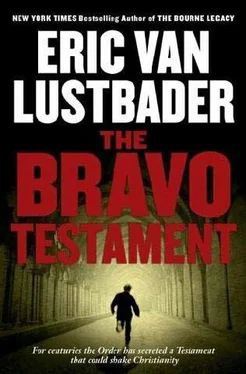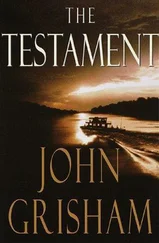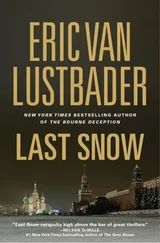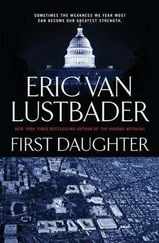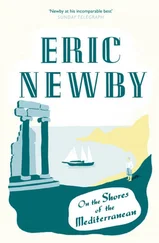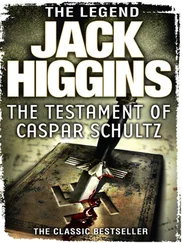"No," Father Damaskinos stammered.
"Five, four…"
"You wouldn't." In his terror, he had reverted to his native Greek.
"Three, two…"
"This cannot be happening. I refuse to believe-"
"One, zero."
Cornadoro brought the tip of the candle flame in contact with the edge of Father Damaskinos's beard. At once, the hair caught fire and, screaming, the priest arched up off the chair. Cornadoro kneed him in the solar plexus. The air began to stink.
"Stop! All right! Stop!" Father Damaskinos managed to get out. "He went to Trabzon! Trabzon, Turkey!"
"Too late." The wicked blade of a push-dagger protruded from between the curled second and third fingers of Cornadoro's right fist. "I told you you wouldn't get a second chance." And with a terrifying efficiency he slashed the priest's neck from ear to ear.
Jordan Muhlmann called Osman Spagna the moment he stepped onto the waiting motoscafo. Behind him rested the Lusignan et Cie Gulfstream G-550 jet on the tarmac of Marco Polo Airport. He had not told his mother he was coming to Venice, and of course, Cornadoro knew nothing of his whereabouts, either. He had people here keeping both of them under surveillance, people he should have used long ago. No matter. He would take care of everything, just as he had promised the Knights of Four, as he thought of them since their intervention on the night of his ascension in Rome.
Spagna said, "I assume you want to do something about the American." Spagna, used to cell phone conversations, would never use a name over the air.
"Indeed, I do."
With a sinister burble of its brawny engine, the motoscafo took off, heading for the lagoon.
"I can take care of that."
"Not that way." Jordan knew Spagna's meaning only too well; for a backroom engineer he was a bloodthirsty fellow. "Something better is called for here, an indelible lesson to be learned. I want the American obedient, not dead, otherwise I will simply have a hole to fill that I cannot afford now."
"Understandably," Spagna said.
The clammy night air clung to Jordan like a shroud, making him restless, and he moved to the side of the motoscafo. They approached the hotel landing where two of his Knights waited for him. "Let me see, he loves cars."
"What American doesn't?"
Jordan laughed. "Ferraris, isn't it?"
"Quite a passion," Spagna said. "He's got twelve."
"Not for long." Jordan's nose wrinkled as he stepped out onto the landing. This stench is positively medieval, he thought. Venice was like death, a rotting corpse someone had forgotten to bury. He shook hands with the Knights, but he couldn't wait to move on. "Personally, I don't care for Ferraris, too damned showy. Arrange something, Osman."
"Immediately." Spagna could not hide the glee in his voice. "He's got two vintage autos that he can never replace."
"Still, if I am any judge of character the loss will only just get his attention. Like all Americans, this one needs to be punched repeatedly in the head before he learns his manners." Jordan, his mind racing ahead, said, "As I remember, he has one child."
"A daughter, nineteen," Spagna confirmed. "And quite beautiful judging by the photo I have here. She is-how do the Americans say it? Ah, yes-the apple of his eye."
"America is a dangerous country, they tell me, the cities so full of violent crime-rapes and beatings, so forth." Jordan stepped away from his Knights, to the end of the landing, lowered his voice. "This is delicate, Osman. I don't want an investigation. A simple robbery, an encounter on a dark street, a working over, followed by an ambulance, a stretcher, hearts in throats, parents in tears, in the end a recovery of sorts, you know what is required."
"Indeed I do, sir."
Jordan put away his phone and went to join his Knights. He was unaccountably eager to get an update on what his mother and Cornadoro were conspiring behind his back. The first word whispered in his ear lifted his spirits considerably.
"I know where Trabzon is," he said. He was thinking of the Knights' attack on the Order's headquarters so many centuries ago, he was thinking about how history does, indeed, come full circle.
The sky was low, grainy as a sleepless soldier's eye, grayed-over with militant clouds when Bravo left the hotel in his reeking clothes. It was already early afternoon-he had slept almost twelve hours straight. He went first to Ataturk Alani, the enormous central square of the city, heading due west from there down a street lined with clubs and clothing stores. It was an altogether ugly place, monstrous slab-sided buildings hulking like defeated wrestlers too dazed to get up off the mat. It could be said that Trabzon was a city of contrasts, but in a way that exploded his luscious visions of local history. The ancient and the modern rubbed shoulders in shabby splendor, but, unlike in Venice, the concrete imperative of the present relegated the splendid, blood-soaked past to the rusting alleyway trash bin.
Entering a shop with up-to-date clothes in the window, he bought himself an entire new outfit into which he changed before leaving the shop. His old clothes he relegated to a dust bin outside. Soon after, he made his way to Ortahisar, the Middle Fortress, the old section of Trabzon. Twice as he wended his way through the bazaar, he thought he was being followed, but one would-be pursuer turned out to be a Russian merchant eager to sell him a set of hand-painted nesting dolls, the other a boy on a bicycle who had nothing more on his mind than racing from point A to point B in the fastest possible time. Still, he could not help being reminded of the attack outside the walls of St. Malo from which Uncle Tony had saved him and Jenny. At the thought of Uncle Tony his eyes started to smart, and he wiped away tears of pain and longing.
When he had spoken to Adem Khalif on the phone, his father's contact had reported being out of the city. Khalif had suggested meeting for drinks and dinner at a cafe on the hill. Bravo crossed one of the two bridges that linked the oldest part of the city to the modern concrete one. The bridges spanned twin ravines, carved out of the bedrock long ago by the furiously gushing rivers-one of which, the Degirmen, was the last clue Dexter had left for Bravo in Venice.
The cafe was perched on a hill, as old and crumbling as its wooden neighbors. Adem Khalif was seated at a table in front and, spotting Bravo, he rose, lifting a brown arm in greeting. Khalif was a broad-backed man with huge shoulders and upper arms. His was not a handsome face, but it was powerful. He was dressed neatly in slacks and a polo shirt. Clearly, he was no priest.
Burly fishermen and slit-eyed oil company executives were their companions, smoking harsh Turkish cigarettes and eyeing a trio of exhausted looking "Natashas," ex-Soviet prostitutes, all rancid smiles and high, pointed breasts, fueling up for their nightly chores with strong coffee, ekmek-sourdough bread-local butter, and the ubiquitous black olives known as zeytin.
"So you are Braverman Shaw, your father talked about you constantly." Adem Khalif spoke perfect English, though with a slight British accent. When Bravo said he'd prefer they speak in Turkish, Khalif was overjoyed. His smile was lopsided and wide, bristling with the glitter of gold teeth.
They sat at a small round table of rough mosaic, near a wrought-iron railing. The rain, forecast by the angry clouds, arrived like a drunken guest, drenching the margin of the terrace beyond the protection of the faded striped awning. It was, if possible, more oppressive here than in Venice.
"Gloomy weather," Bravo said as he sat down opposite Khalif.
"This is summer on the Black Sea." Khalif shrugged. "One gets used to anything." He poured from a bottle of raki and they clicked their glasses together. Khalif watched Bravo as he drank the fiery liquor.
Читать дальше
